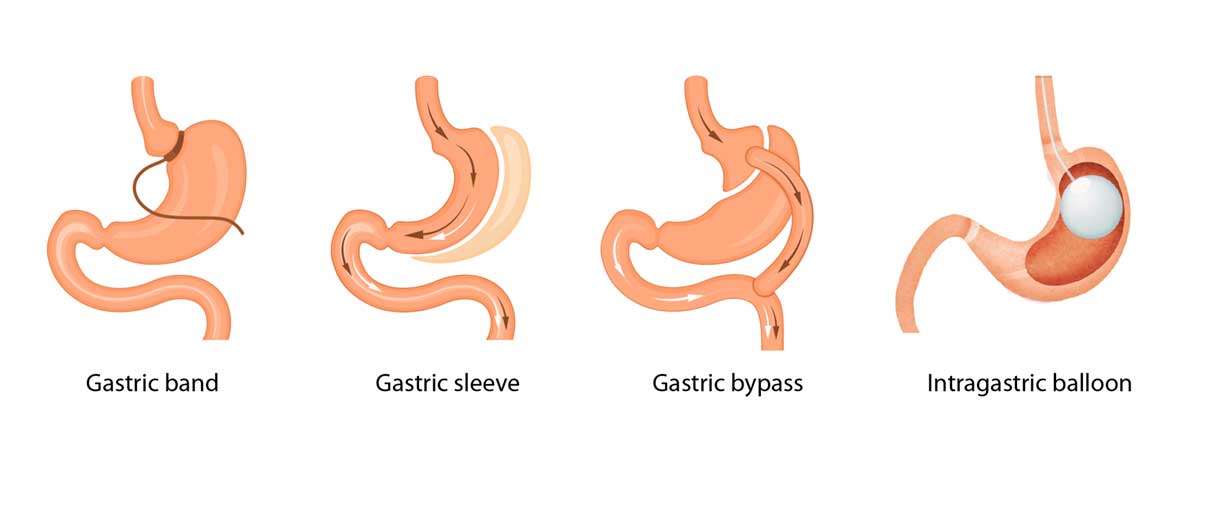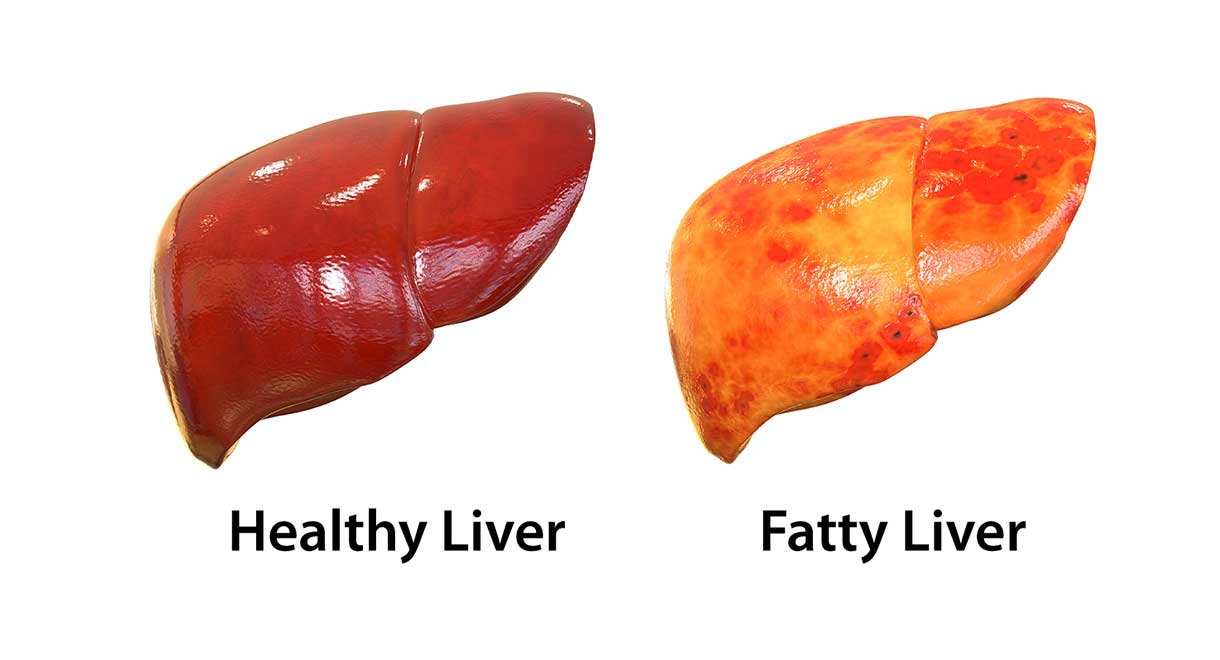Weight Loss Surgery (Bariatric Surgery)
Commonly performed surgical operations for the treatment of obesity worldwide are sleeve gastrectomy (SG) and Roux-en-Y gastric bypass.
Laparoscopic adjustable gastric banding (LAGB) is also popular and is a surgical procedure that involves the placement of an adjustable band around the upper portion of the stomach using a laparoscope. The band is made of silicone and can be tightened by adding saline to fill the band (like blowing air into a doughnut-shaped balloon).
A non-surgical weight-loss procedure called the Intragastric Balloon involves the insertion of a specialised balloon inside the stomach to occupy space; this reduces the food carrying capacity of the stomach. This makes you feel full quicker and limits your food intake to smaller portions. The procedure is temporary and the balloon is usually removed after a period of 6 to 12 months. A gastric balloon is recommended for those people who are not good candidates for weight loss surgery.

Weight loss surgery is just one tool to help you achieve permanent weight-loss and is not a complete management solution by itself. For lasting success, you will need to change your eating and exercise habits after this surgery.
Weight loss surgery is considered to be the most effective and lasting treatment choice for severe obesity
After surgery the majority of patients lose weight rapidly and continue to do so until 18 months after the surgery. It is typical for patients to lose 30 to 50 percent of their excess weight in the first six months, and 77 percent of excess weight as soon as 12 months after surgery. Another study found a 50 to 60 percent loss of excess weight could be maintained up to 10 to 14 years after surgery. The success of weight-loss surgery is usually judged as achieving a 50 percent loss or more of excess body weight and maintaining that weight level for at least five years.
Long term results
Long term results can vary a lot and depend upon factors such as:
- The commitment to dietary and lifestyle improvement
- Ongoing professional support
- Motivation and cooperation of family and friends
- Age
- Weight before surgery
- General health
- Specific type of surgical procedure
- Ability to exercise
Obesity is associated with serious health conditions and symptoms including:
- Cardiovascular disease and high blood pressure
- Diabetes
- Increased risk of strokes
- Increased risk of cancer
- Back pain
- Arthritis in weight bearing joints
- Difficulty exercising due to shortness of breath and pain
- Severe reflux and indigestion
- Sleep apnea
- Depression
Weight loss surgery can be effective in overcoming severe obesity and has been shown to greatly reduce and even reverse some of these health conditions. Some diabetics no longer need to take any medications after weight loss surgery because their diabetes is reversed.
Diabetes can respond very well to weight loss surgery
Around 90 percent of patients with Type 2 diabetes achieve good results within a few weeks after surgery. Many are able to reduce or totally quit medications, including insulin injections. An increasing number of studies suggest that bariatric surgery may be the best treatment for diabetes for the seriously obese patient.
Tips for success after bariatric surgery
- Eat three meals a day.
- Eat protein and vegetables at each meal. Eat your protein first.
- Eat nutrient-dense unprocessed foods such as vegetables, nuts, seeds, eggs, cheese, plain yogurt, fruits, and poultry, seafood and meat.
- Do not eat processed or high carbohydrate calorie-dense foods such as desserts, chocolate, chips, pretzels, cookies, biscuits, noodles, ice cream, deep fried food, sweets and fast food take out.
- To get your calcium, eat plain Greek yogurt, tahini or hummus.
- Do not drink carbonated beverages such as sweet soda, soft drinks, pop, diet drinks. Carbonation can stretch out your pouch causing your appetite to increase. Do not use straws to drink liquids because they cause air bubbles to form in your new pouch which can lead to stretching and pain.
- Avoid fruit juices and alcohol due to their high sugar content.
- Drink 6 or more glasses of plain water or herbal or weak black tea daily. You can drink coffee but do not add sweetener. Do not drink anything with citric acid.
- Avoid drinking liquids 30 minutes before meals, with meals, or for 30 minutes after meals.
- Take at least 30 minutes to eat your meal and chew your food to a pureed consistency. This takes a lot of chews – generally 20 to 30 chews.
- Start a regular exercise program and as your weight decreases gradually build it up so you are doing 30 to 60 minutes daily.
- Keep a detailed diary of your food intake and exercise activity for your dietician or Weight Loss Detective.
- The first three months after surgery, do not eat citrus or acidic foods such as tomatoes, lemons, grapefruit, oranges, or limes.
Many studies and clinical research have shown that bariatric surgery alone is often not effective after 10 years. This is because people need to make lifestyle, behavioral and dietary changes along with the surgery to achieve sustainable weight loss.
If the patient cannot maintain these changes, then the excess weight will often gradually come back. Although bariatric surgery can be helpful for people who have tried and exhausted all other methods of weight control, it is important to understand that such surgery is no replacement for changing the systems that lead to weight excess.
Failure after bariatric surgery is defined as achieving or maintaining less than 50% of excess weight loss (EWL) over 18 to 24 months or a body mass index (BMI) of greater than 35.
After bariatric surgery people require lifelong monitoring for nutrient deficiencies and some people need a repeat surgery. Notwithstanding these drawbacks, the number of obese patients undergoing bariatric surgery will continue to grow.
After bariatric surgery a healthy diet and exercise are vital. You can easily put a lot of the weight back on if you continue to consume a high carbohydrate diet. It is easy to fit sweet drinks, ice-cream, soft cakes, chocolate etc into your stomach even after a sleeve gastrectomy. The sugar will be absorbed and turned into fat
After bariatric surgery you may find it uncomfortable eating hard salad vegetables and large pieces of meat. If so, you can use a vitamiser to make soups out of raw vegetables and fruits. You can also make soups from mince meat and vegetables and puree them if it makes it easier to digest.
Protein shakes such as Synd X Slimming Protein powder can help to keep you satisfied and you can add some chia seeds and coconut cream to reduce constipation.
Nutritional deficiencies after weight loss surgery
For adults undergoing bariatric surgery, lifelong nutritional support is vital for a good health outcome. After surgery, patients are at increased risk for many nutrient deficiencies and if not treated these can lead to anemia, chronic fatigue, a weakened immune system, or osteoporosis. For many patients, nutritional challenges are present even before surgery, according to experts. It is not uncommon for bariatric surgery patients to have deficiencies before surgery is done such as inadequate levels of the water-soluble vitamins B12, B1, folate and C and the fat-soluble vitamins A, D, E and K and the minerals iron, zinc, selenium, calcium, magnesium and copper. These should be addressed before surgery.
Many patients contemplating weight loss surgery are unaware that the surgery causes permanent changes to their bodies and will affect their ability to absorb nutrients.
Patients who vomit after gastric surgery are at increased risk for thiamine depletion and over the years this can lead to brain problems. The liver stores vitamin B12 for a long period of time so that vitamin B12 blood levels may remain normal for months after sleeve surgery, and then plummet to dangerously low levels. The gastric sleeve operation removes the part of the stomach responsible for secreting intrinsic factor, which is needed for vitamin B12 absorption from the gut. It is necessary to have vitamin B 12 injections every 3 to 4 months as oral vitamin B 12 supplements may not be absorbed efficiently because there is not enough stomach tissue left to make the intrinsic factor essential for vitamin B 12 to be absorbed from the intestines.
It is not uncommon for a vitamin B12 deficiency and/or pernicious anemia to develop years after surgery. Vitamin B 12 deficiency can cause severe damage to the nervous system including degeneration of the spinal cord and increased dementia risk.
After bariatric surgery, patients may have reduced absorption of iron leading to anemia, as well as reduced absorption of vitamin D and vitamin K and calcium, leading to loss of bone density and osteoporosis.
For the years that follow weight loss surgery, regular blood tests are essential to monitor levels of iron, calcium, zinc, magnesium and vitamins B12, D and K and folic acid.
Weight loss surgery and your liver
Being significantly overweight is often associated with fatty liver which is an unhealthy condition of the liver where it becomes enlarged and inflamed with excess fat deposits. Fatty liver can lead to liver cirrhosis and liver failure.

Weight loss surgery is gaining in popularity for obese individuals, especially if they have a fatty liver. Weight loss surgery can help reduce liver inflammation and scarring caused by obesity, but it can also cause some unwanted liver problems.
The current evidence suggests that bariatric (weight loss surgery) surgery for patients with severe obesity decreases the grade of fatty liver, liver inflammation and cirrhosis (scarring of the liver). However, the lack of randomized clinical trials demonstrating the beneficial effects of bariatric surgery procedures for the treatment of Non-Alcoholic-Fatty-Liver-Disease (NAFLD) prevents us from reaching a scientifically sustained conclusion. The research also reported a potential risk for worsening of liver fibrosis (permanent scarring) scores. Therefore, bariatric surgery must be assessed in future randomized clinical trials.
Weight-loss surgery is often sold as a magic pill for problems ranging from morbid obesity to diabetes. But few surgeons will warn you of the severe side effects it may cause if measures are not taken to assess the condition of the liver prior to the surgery.
Doctors at the Institute of Liver and Biliary Sciences (ILBS) in Delhi, said they have received at least three patients over the past one-and-a-half years with liver failure caused from weight-loss surgery. They recommended that any patient going for a weight-loss surgery must consider complete assessment of their liver condition first. Liver function blood tests (LFTs) may not give a totally accurate picture of the liver state. Ideally a fibroscan or MR spectroscopy of the liver should be done pre-surgery to exclude liver cirrhosis.
Recent studies have pointed out more liver specific weight loss surgery problems:
- Risk of paracetamol (acetaminophen) poisoning – A San Francisco study found that people who have had certain types of weight loss surgery may be at increased risk of acetaminophen poisoning and, in turn, liver failure. Researchers suspect that because obesity often causes liver damage, weight loss surgery patients may still have weakened livers that are more susceptible to harm from drugs such as acetaminophen and other pain killers.
- Risk of alcoholism – As reported in the June 2012 edition of the Journal of the American Medical Association, researchers found that a year after weight loss surgery, the risk of becoming an alcoholic is significant. Researchers think that some types of weight loss surgery can change how the body digests and metabolizes alcohol.
Weight loss surgery carries a long list of possible risks, but it can be lifesaving for some people. For obese persons who have not been able to lose weight with other methods, weight loss surgery is a serious option. If weight loss surgery is finally decided to be the best choice, those undergoing this procedure must take extra care of their liver health – because the liver benefits of significant fat reduction will only be worthwhile if committed to caring for the liver by avoiding excess sugar, alcohol and liver toxic medications.
For more information see Dr Cabot’s book Fatty Liver You Can Reverse It.
References for bariatric surgery:
https://bmcendocrdisord.biomedcentral.com/articles/10.1186/s12902-020-0499-4
https://www.ncbi.nlm.nih.gov/pmc/articles/PMC3470459/
Bariatric surgeon Dr Cywes – explains why bariatric surgery by itself usually fails
Bariatric surgeon Dr Cywes


Leave A Comment